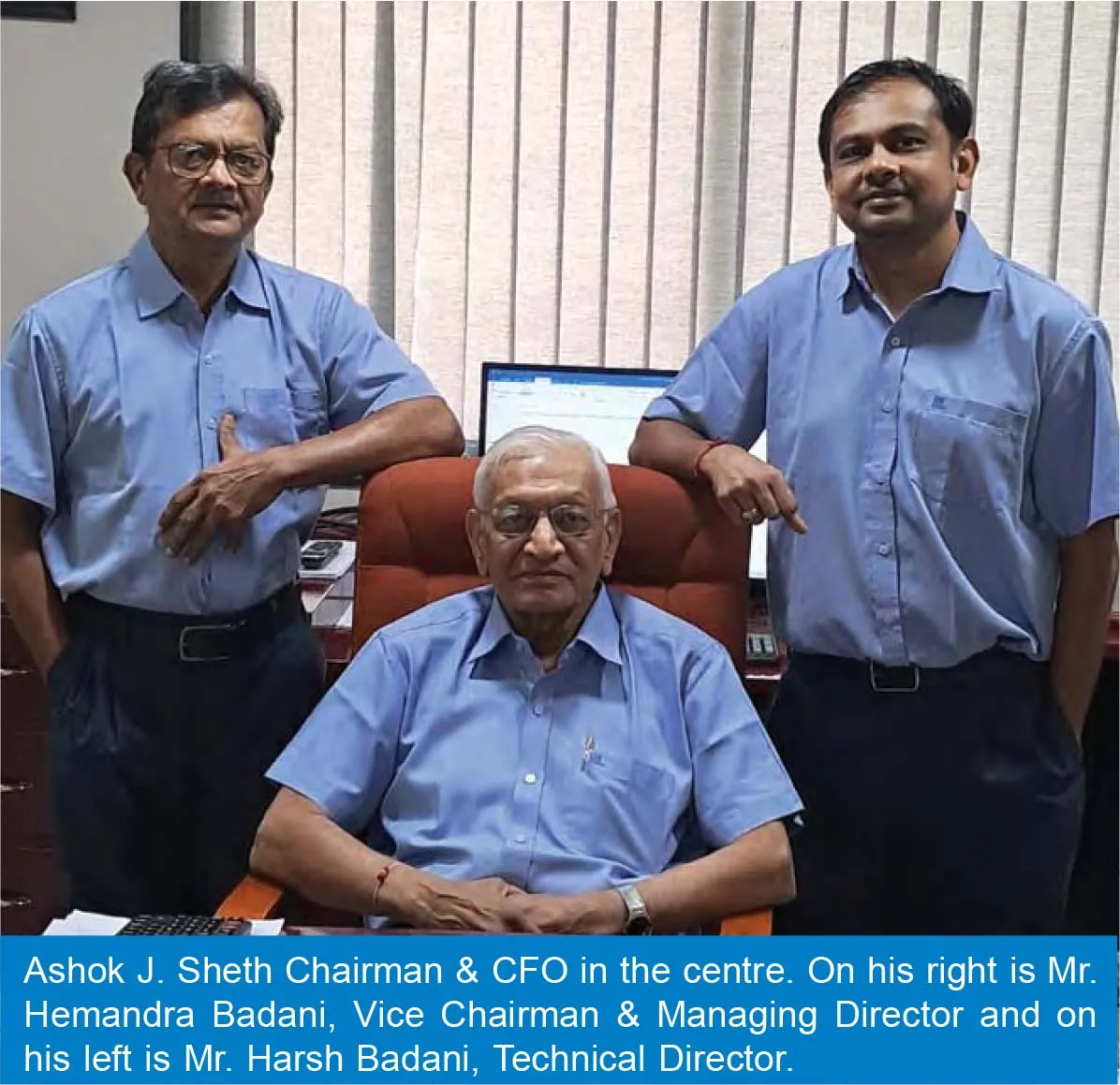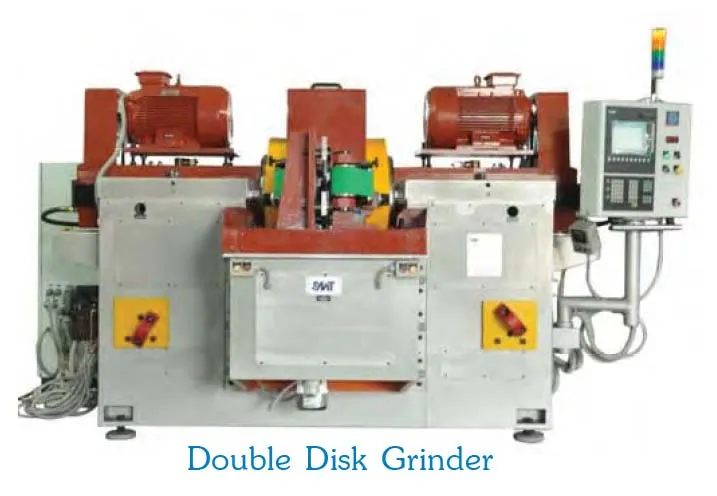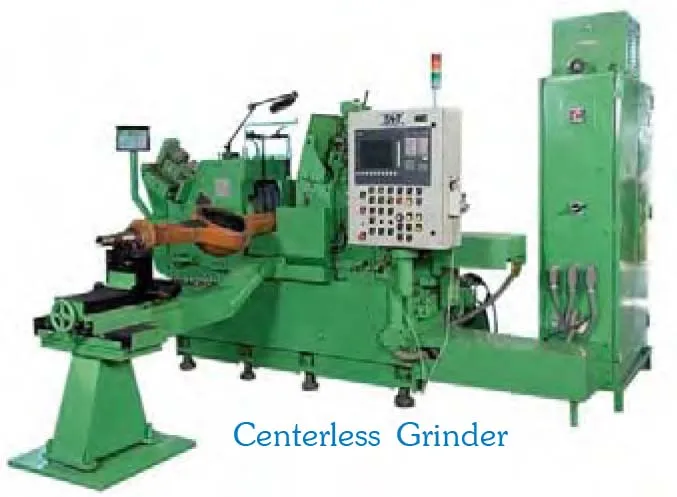Want to Subscribe?
Read Corporate India and add to your Business Intelligence

![]() Unlock Unlimited Access
Unlock Unlimited Access

Published: June 15, 2024
Updated: June 15, 2024
Based at Vadodara, Gujarat, BSE-listed Solitaire Machine Tools (SMT), though a relatively small entity in terms of revenue and profits, has a strong business vertical and good potential to spread its wings to grow seamlessly in the manufacture of centerless grinders.
With two manufacturing units at Vadodara and a new plant coming up at GIDC, Halol, SMT is led by Ashok J Sheth, Chairman, and Hemendra Badani, Vice-Chairman and Managing Director. Due to its strong research, product development and insistence on cutting-edge technology, the company is today the best-known centerless grinder manufacturer in India during its journey of over three and a half decades and with strong recognition in ten overseas countries.
At the beginning of its journey in 1987, SMT purchased the technology from US-based Cincinnati Milacron, then the largest machine tools manufacturer, with a focus on exports back to the US. It became India’s first 100% EOU in the machine tools space.

“The management was very quality-conscious right from beginning. Hence, the principal in the US highly appreciated it and agreed to enter into a buy-back agreement with the company for the first seven years of our production. This gave us a tremendous boost as we did not have any tension or uncertainty over marketing and focused totally on production and simultaneously learnt new technologies and competitiveness,” avers Mr Sheth with a glint in his eye.
He adds, “This gave us the opportunity to build a good foundation to meet international standards and grasp the technology aspect, especially from the world’s largest centerless grinder manufacturer, Cincinnati Milacron.”
Later, the company shifted its focus to meet the growing domestic demand and simultaneously continued catering to the US and a couple of other countries as well. So far, SMT has been successful in producing seven different models and over 80 variants of grinders to meet customized demand.
The company produced its first CNC grinder way back in 1994. Basically, these are used in auto ancillary, precision engineering, bright bars and medical implant industries, in addition to defence, aerospace and nuclear applica

The year 2007 became a landmark year in SMT’s history because it entered into a technical tie up with Bocca & Malandrone, Sunebo, SpA, Italy for the development of advanced technology in CNC centerless grinders. Primarily, these grinders are designed to produce components with very close tolerances on a consistent basis. “Initially, this range of grinders was imported to India but are now made in India with over 95% Indian content. This gives us great satisfaction and pride in our capabilities,” says Mr Badani with a sense of pride.
In another important and gamechanging development, SMT entered into an agreement with Italy-based machine tools design company Laboratorio Ecellenza Italiana for the design of a double disk grinder for higher grinding production of two opposite faces of components accurately. This category of grinders is largely used in manufacturing automotive components and bearings.
With advancements in the automotive field for a reduction of the carbon footprint and better fuel average, more precision components are necessary. SMT has taken up the challenge to meet these exacting standards and work to close tolerances of 1 micron (a typical human hair is 30 microns in diameter). Harsh Badani, whole-time Director and in-charge of Development and Manufacturing, is proud to offer such tolerances, which were earlier possible with European and Japanese grinders only. SMT machines are now being used for the manufacture of components for electric vehicles. SMT has helped meet the export demand for automotive and engineering components with full automation and man-less operations. Now, almost 90% of the grinders produced are CNC.
SMT is one of the critical suppliers to nuclear fuel complexes for meeting grinding needs of radioactive pellets, zirconium parts and various other similar components, thus making India’s nuclear power projects an indigenous success.
SMT is also associated with Midhani, a government of India listed PSU, for manufacturing special parts and fasteners for space and defence projects for specialized applications.
SMT has an inhouse facility to machine all critical castings with almost 80% CNC machines procured from European, American, Japanese and Indian sources to achieve close tolerance components for the assembly of centerless grinders.
The company has a full-fledged assembly area with an experienced workforce that has an average experience of over 18 years. All the required equipment is available. SMT also has a quality control department to inspect every component that is produced and procured as per SMT drawings. Customers’ parts are inspected with sophisticated equipment during run-off of grinders produced by SMT to meet customers’ requirements.

The SMT customer base consists of major automotive components manufacturers in tier 1, tier 2 and tier 3 cities, producing for Indian as well as global auto manufacturers. Parts produced on SMT grinders are used in Jaguar, BMW, JCB, Caterpillar, Mercedes, Hyundai and practically all Indian auto manufacturers. As they say, for everything that moves, SMT has some input in making it happen smoothly.
SMT is associated with a US-based company which procures machines in the CKD format from it and assembles them in the US to meet demand in North America, Europe and China. These grinders are principally produced to meet the demand of aerospace component manufacturers catering mainly to Boeing, Airbus and Lockheed. Some of these customers are now planning to set up plants in India to meet the growing domestic demand for aircraft, and as a result, SMT might get benefited going forward.
“We are setting up a new plant in the Halol GIDC area. The plant is currently under construction over an area of roughly 40,000 sq ft. It should be ready by September 2024. We are currently working out of the Chhani plant and the Gorwa Plant. Both plants have a machine shop for machining of compo
nents as well as an assembly shop. The Chhani plant area is now being converted into a commercial and residential zone and industries are being advised to move. This plant is our first plant and is being used since inception in 1987. It started as an 8,000 sq ft area and we continuously added more to reach about 27,000 sq ft today. The Gorwa plant was built about 17 years back to meet the requirement of space,” informs Mr Badani.
Adds Mr Sheth, “We are now proposing to move all our machine shop equipment to the Halol GIDC and concentrate only on manufacturing of components in Halol. Our Gorwa plant will be an assembly plant besides the administrative office and registered office of the company. The Chhani plant area will be sold after all activities are closed. The whole exercise is to improve working efficiency and optimize time spent of all employees. Today, we find spare manpower or machines in one or the other planta, frequently resulting in time lost. We propose to spend about Rs 10 crores on this project and it would be recouped from the sale of the Chhani plant. So far, the majority of the project cost has met from internal accruals and the rest from bank term loans. We expect to have added capacity of 10-15 % by 2025-26.”
The company has an excellent track record of profit making and dividend paying. Moreover, for most of its existence, it has remained debt-free and even today its borrowings are minimal to meet only its capex requirements. After the commencement of the new manufacturing facility at Halol, the company is determined to optimize capacity utilization supported with improvement in the EBIDTA margin and project debt retirement upon selling the Chhani, Vadodara plant.
During the recently concluded FY 24, the company achieved operational revenues of Rs 20.86 crore and PAT of Rs 1.80 crore translating into an EPS of Rs 3.97 on its tiny equity capital of Rs 4.54 crore. The book value per share stands at Rs. 39.72. The promoter group holds 45.25 %. The board has recommended a dividend @17.5%; i.e., Rs 1.75 per share.

September 30, 2024 - Second Issue

Industry Review

Want to Subscribe?
Read Corporate India and add to your Business Intelligence

![]() Unlock Unlimited Access
Unlock Unlimited Access
Lighter Vein

Popular Stories
Archives
